The six street pastors joined hands and prayed before heading out from the Salvation Army on Cumberland Avenue just after 9 p.m. Friday, armed with Tootsie pops to hand out to whomever they encountered in downtown Portland over the next five hours.
What’s a street pastor? That’s what most of the people wondered when they were greeted by a group of strangers dressed in matching coats and ball caps bearing the title.
Some whispered to their friends after passing by the troupe: Were they police? Preachers?
Others who were curious enough to ask them to their faces were surprised by their answer.
“We’re just here to spread love,” said Scott Loeffel of South Portland, leader of the team that was out Friday night.
In total, 38 members of five churches have volunteered to spend one Friday night a month patrolling the streets of Portland for people who could use their help, whether that’s lending an ear or calling a cab.
In their walking tour of the heart of Portland – from Oxford Street, over to Congress Square Plaza, through the Old Port and down Commercial Street – they said hello to everyone they passed, while looking out for anyone in need, from the homeless to bar hoppers.
Police officers have a nightly presence outside the bars in the Old Port, but their purpose is to prevent revelers from getting out of control, not to offer them a hand. Although street pastors in other communities have reported that their work has resulted in a reduction in crime, Portland police are unsure whether the addition to the downtown will be an asset or a nuisance to officers.
After attending an eight-hour training course at the beginning of March, the first team hit the streets two weeks ago.
Portland is the third U.S. city to have street pastors. The first group formed in 2013 in Chico, California, a college town with an active bar scene. The next year, another one came together in Bangor.
LONDON TO BANGOR TO PORTLAND
The organization got its start in London in 2003 as an initiative of Ascension Trust, an interdenominational Christian nonprofit. Street pastors are now at work in about 270 communities in the United Kingdom and 11 cities and towns in seven other countries, from Jamaica to Gibraltar.
Kurt Holmgren, the outreach pastor at Eastpoint Christian Church in Portland, first heard about the program while listening to a podcast a couple of years ago, then read a book written by the founder of the street pastor program.
When he found out that a group existed in Bangor, he and a half-dozen people from his church went up to tag along for a night.
Since then, Holmgren has been working with the parent organization to get a group started in Portland, culminating with a launch event in January to recruit volunteers.
Every street pastor has to get a referral from his or her church and shell out $95 for a uniform and a background check.
A stipulation of the program is that the volunteers come from several churches, but, for now, most in Portland are members of Eastpoint, a congregation that’s rapidly growing and looking to relocate from a former warehouse by the Portland International Jetport into large, vacant store buildings near the Maine Mall.
Eastpoint paid to fly two trainers over from England and, so far, has covered the costs of supplies to hand out to people on the street, including water bottles, hand warmers, fleece jackets and flip-flops for women who want out of their heels.
Holmgren hopes donations will cover future expenses.
Members of the team walking its first shift Friday described their decision to volunteer as a calling.
Angela Story, Loeffel’s wife, said she felt a tug at her heart when she first heard about the mission, even though it was out of her comfort zone.
Not long after, she was talking to a childhood friend who is now a minister in London and the street pastors program came up without her mentioning it.
“I was like, OK, I get it, I’m supposed to be a part of it,” she said.
Jeff Verrill, a general contractor from North Yarmouth, said he sits in the back of the church during services and generally likes to stay behind the scenes. But when he heard about street pastors, something inside him told him to step up.
“I couldn’t explain it,” he said about the feeling he got.
Verrill believes it could be an unintrusive way to bring Christianity into the community.
“Knowing the spiritual deadness of New England, I felt that this was a good start,” he said. “We’re not judge. We’re not jury. We’re just out here showing people we care.”
HELPING ANYONE, RISKING TROUBLE
Eustace Constance, operations director for Ascension Trust and one of the trainers who visited Portland from England, said churches often are accused of not being involved in their communities.
Having church members, many of them senior citizens, outside at night catering to the bar crowd is a way to help change that.
“They kind of think we should be in bed,” Constance said about the reaction from the public.
And they’re doing more than making sure people get home safely, he said.
“Wherever our street pastors operate, there’s a reduction in crime and social disorder,” Constance said.
Police in Bangor and Chico, however, couldn’t vouch for that in their cities. They said they’re aware the street pastors are out there, but don’t have much contact with them.
Portland Police Chief Michael Sauschuck applauds the group’s intent, but is skeptical about what impact it can have.
“I think that all remains to be seen,” he said. “They seem like nice folks trying to do the right thing.”
However, he worries that they could elicit a reaction they aren’t expecting or find themselves caught in the middle of a fight.
“I always have concerns for people’s safety when they’re out in certain settings at certain times,” Sauschuck said.
Sure enough, not long after bar closing time on Friday night, the street pastors were talking to a bar patron on Wharf Street when shoving within a group nearby turned to fisticuffs, just out of sight of the line of police officers squared off along Fore Street.
The street pastors’ training taught them not to get involved and they retreated from the scene.
For most of the night, their work consisted of conversations.
They talked to people outside the Oxford Street Shelter, a young man in a wheelchair and a woman who told the volunteers how she had lost custody of her son. In the Old Port, there were people happy to have someone to chat with while standing outside to smoke a cigarette, and bar doormen who were curious about their cause.
Conversation topics ranged from March Madness basketball to poverty in Mexico. For some who told of the difficulties they were facing in life, the street pastors asked if they could say a prayer and found that their words were welcome.
Although some people they encountered mocked their religious beliefs and questioned their motives, most changed their tune when they found out they weren’t trying to convert anyone.
Alyssa Russell, 27, of Portland assumed they were Jehovah’s Witnesses when they approached her and her friends outside Binga’s Stadium on Free Street, and was pleasantly surprised to learn their purpose – and to get a Tootsie pop.
“If they’re just out here talking and looking around to see if people need help, that’s great,” she said. “We need more people like that in our community.”
IMPACT NOT IMMEDIATELY KNOWN
Near the end of the night, the street pastors were taking one last stroll down Fore Street when they saw a young woman by herself, without a coat, leaning against a fence, her head bent over her cellphone.
The two women on the team asked if she was all right, and soon found out she was having trouble standing, as she lost her balance while they spoke. She thought her friends had gone into the nearby Five Guys restaurant, but she couldn’t find them there or connect with them on the phone.
The street pastors gave her a bottle of water and helped her call her friends back, then waited with her, holding her steady, until someone came to pick her up.
Constance, the trainer from England, said it’s often not until after the fact that street pastors find out how much their help meant.
“People, their lives have been saved,” he said, noting instances where people have told street pastors they had been contemplating suicide on the nights they spoke with them. “You never know what you’ve averted until a person later comes up to you.”
And through those stories, their reputation has spread.
Much like the street pastors themselves, the organization doesn’t force itself on anyone, but provides support where it’s needed as new communities form their own teams.
“We don’t go knocking on doors and say do you want it,” Constance said about how cities end up with street pastors. “They get in contact with us and we take it from there.”
Send questions/comments to the editors.


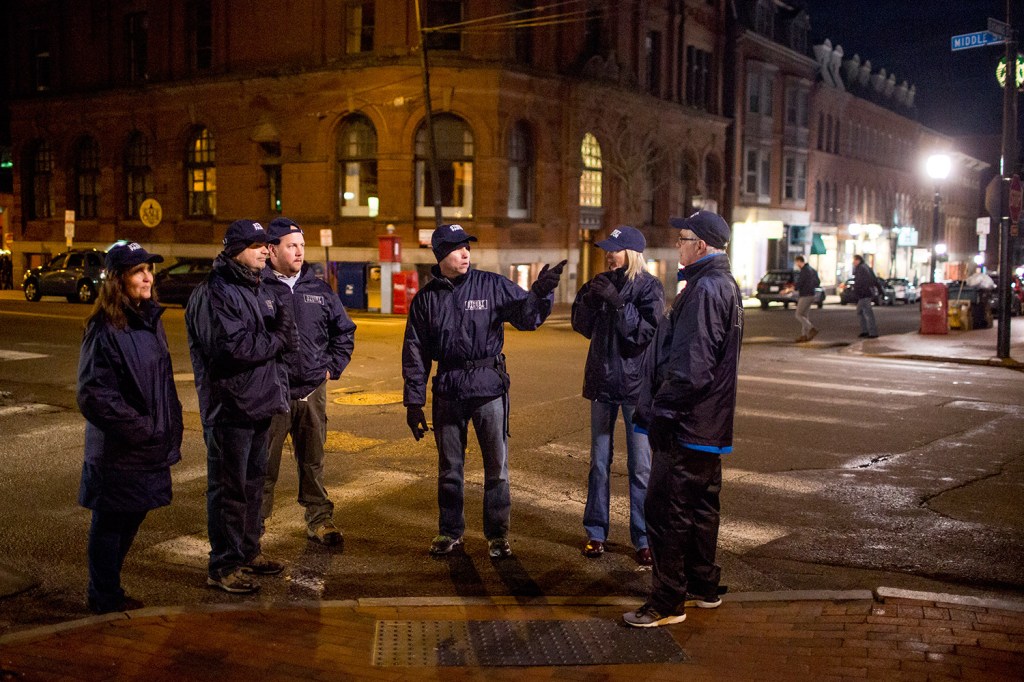
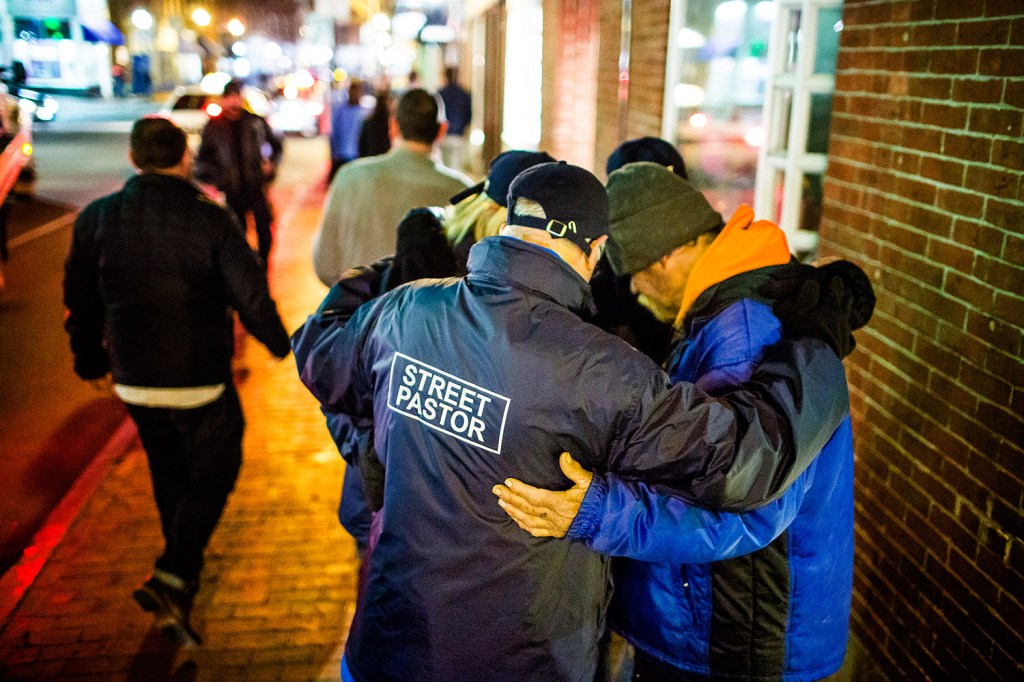
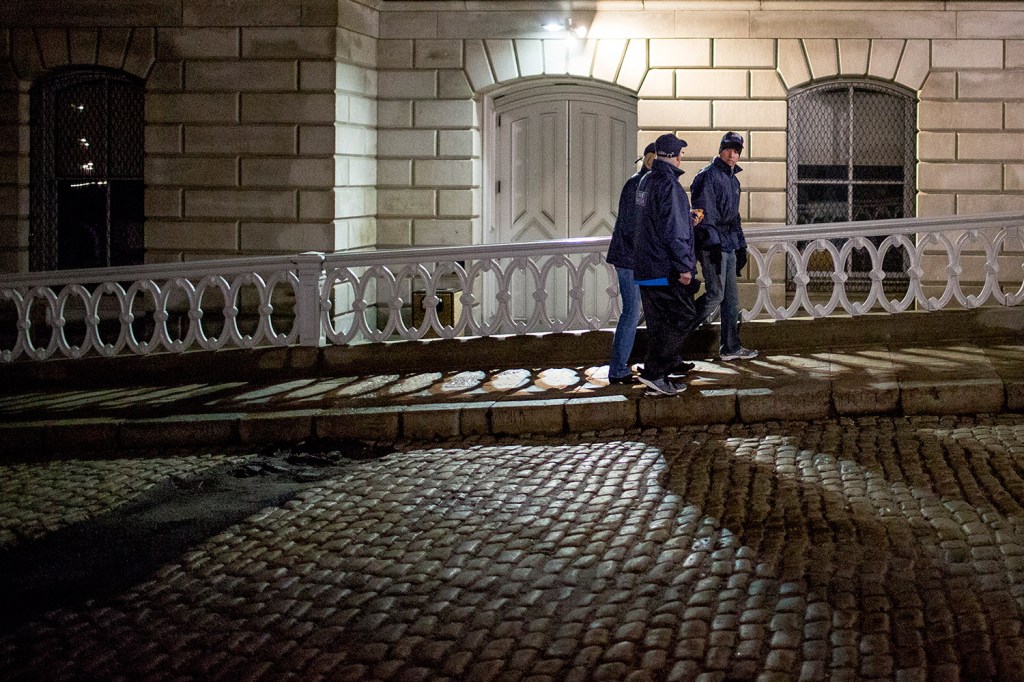
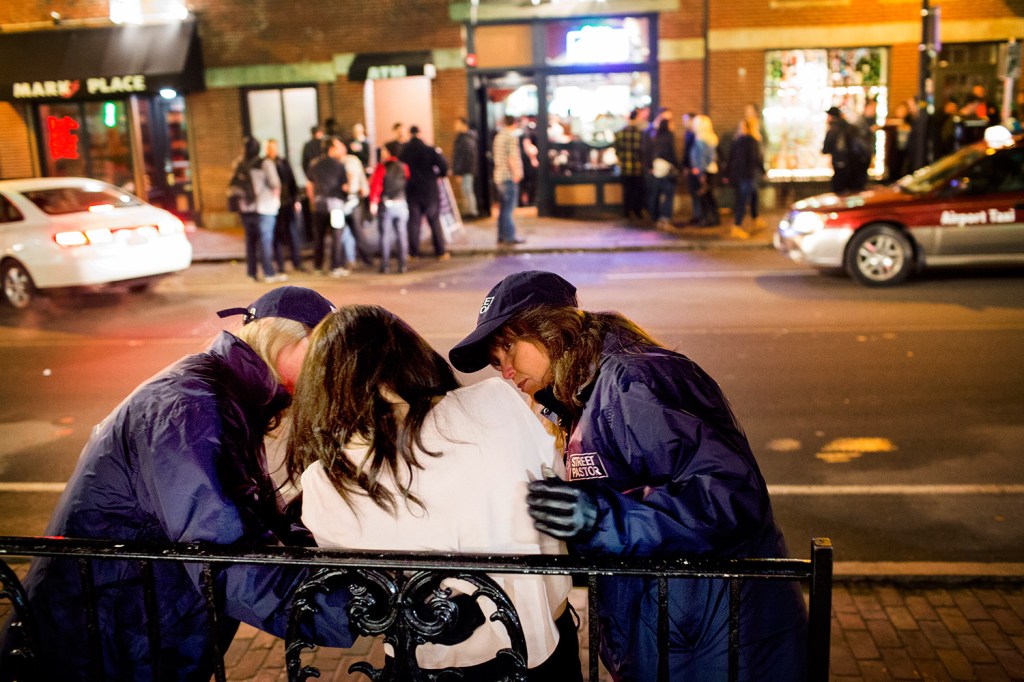
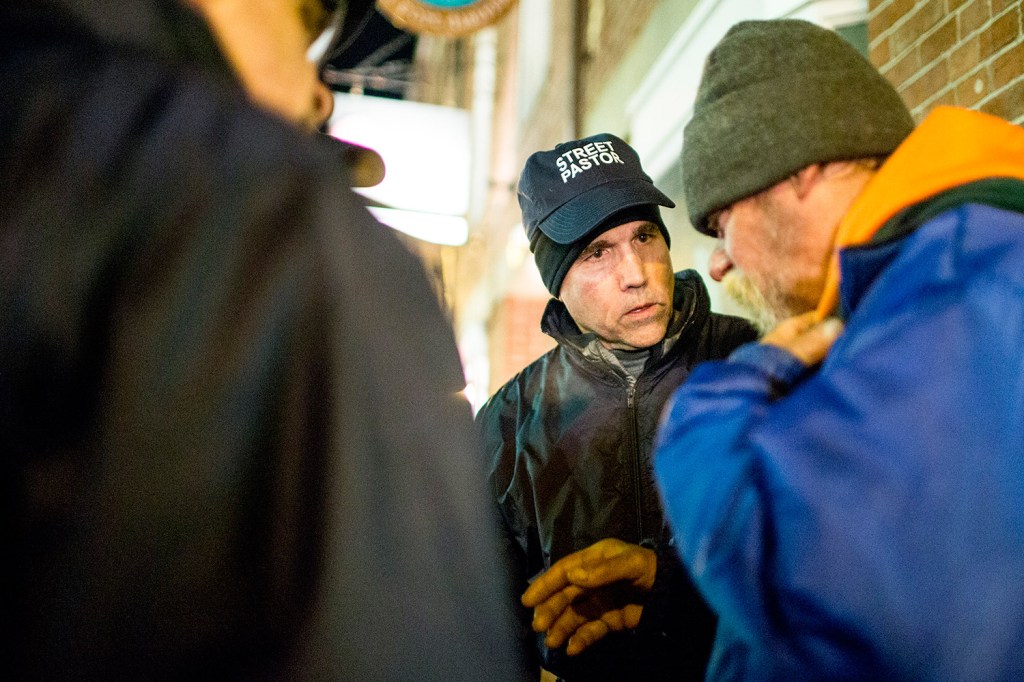
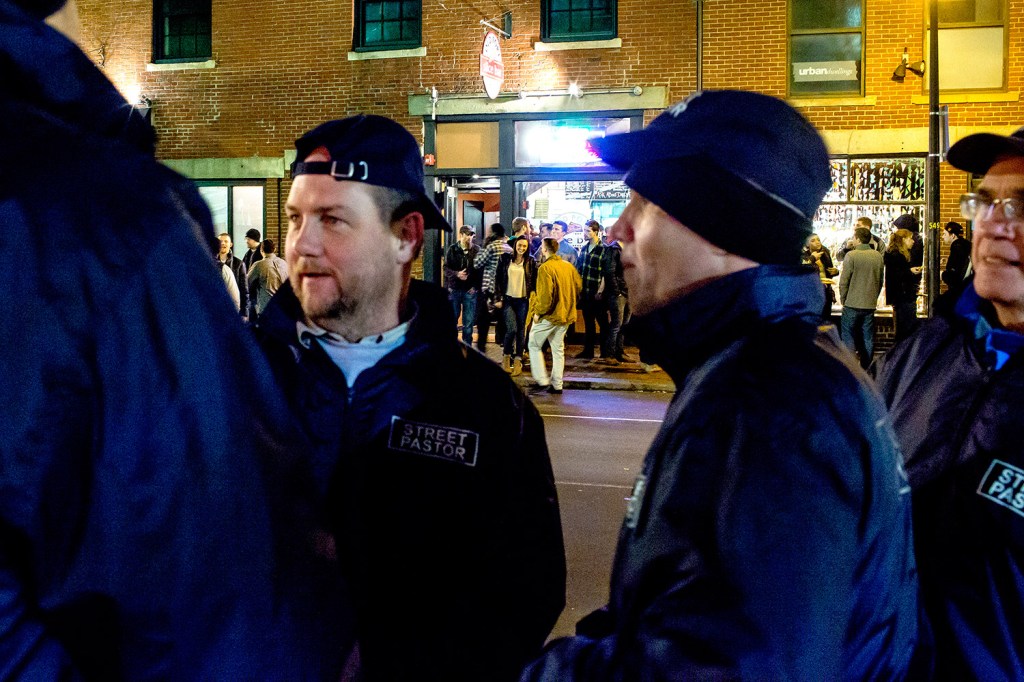
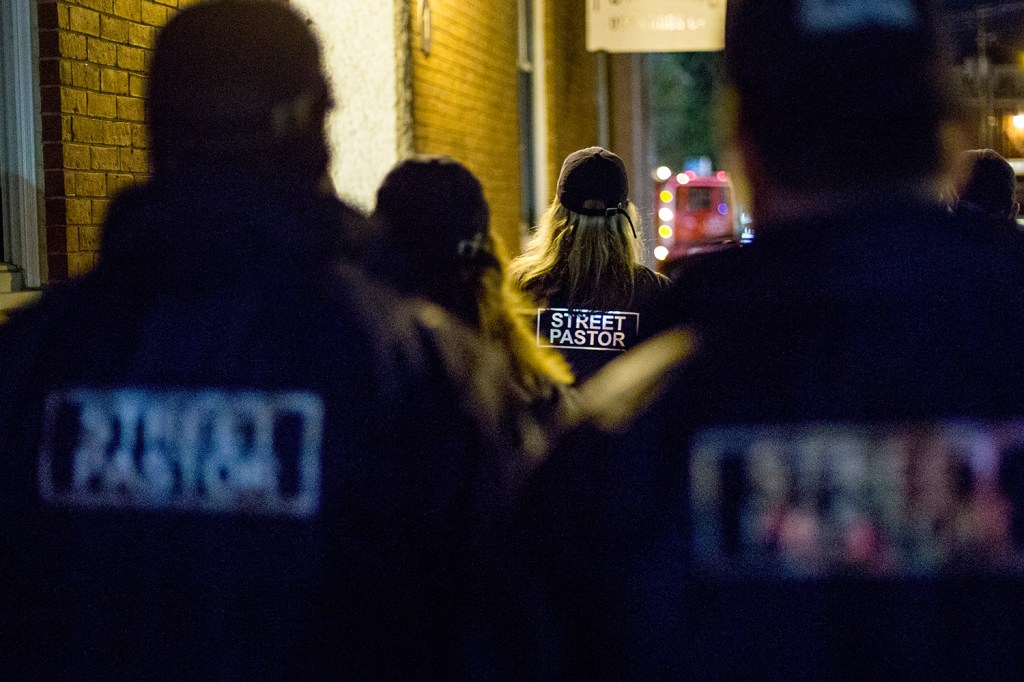

Comments are no longer available on this story